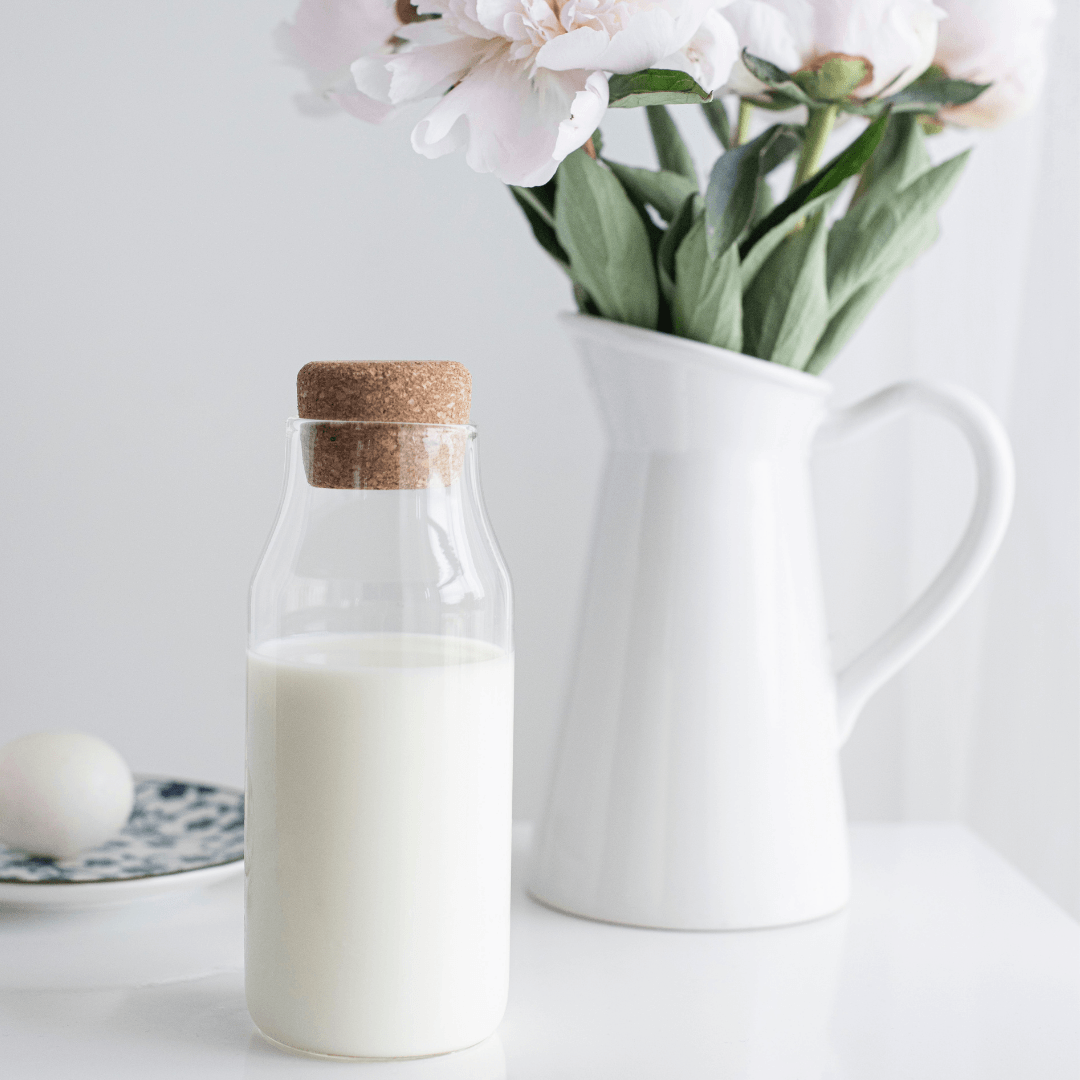
Milk is touted for offering the most balanced nutritional content. But at what cost? Once you scratch the surface, it’s not all that it’s cracked up to be.
Let’s first consider its bone-strengthening calcium. While milk’s calcium content is high, the proteins in milk are tough to digest. This is because they turn to acid, and our bodies compensate with calcium taken from our bones. As a result, milk leaves us with a calcium debt, rather than a surplus.
Meanwhile, many people simply can't drink milk. Roughly 25% of Americans are lactose intolerant. This estimate goes up for people whose origins are African (80%) or Asian (100%).
On top of this, conventional dairy also has added hormones that are linked to an increased risk in prostate and ovarian cancer. Farmers also treat cows with antibiotics that end up in our waterways.
The sustainability profile of milk isn't pretty, either. Dairy accounts for 4 percent of the total GHG emissions on the planet, and almost 5 percent of the total global water footprint comes from dairy production alone. It gets even worse when you factor in the toxic manure lagoons. These lagoons can overflow when storms pass and contaminate drinking water. Yuck.
So why drink milk when you don't have to? There are a lot of milk alternatives available--so many that it's hard to know which one to choose. That's why we've pulled together a list of non-dairy milks that are not only kinder to the environment, but also packed with healthy nutrients. Whether you're vegan, vegetarian, or just curious, plant-based milks are a fantastic way to go.
Note: All nutritional information in this article is drawn from the USDA Branded Food Productswebsite, and it is measured per cup. The products used for comparison in this article were all unsweetened varieties, but nutritional content varies depending on the brand and type of milk product you select.
1. Soy Milk, not Sour Milk
Calories: 110
Protein: 6g
Fat: 7g
Carbs: 5g
Sugars: 3g
Sodium: 141mg
Calcium: 0mg
Saturated Fat: 2.5g
Cholesterol: 0mg
Soy milk is one of the best dairy-free alternatives from a nutritional perspective. It contains healthy fat, high protein like milk, and isoflavones (phytonutrients that reduce your risk of cancer). At the same time, its sugar content is only a quarter of the sugar in milk. However, its flavor has hints of bean, which may not pair well with your breakfast cereal.
Environmentally speaking, soy is an efficient crop to grow. But for just that reason, farmers grow it as a monoculture to feed livestock. Monocultures decrease biodiversity, and they involve intensive pesticide use and fertilization, which have negative environmental impacts due to runoff.

2. Almond Milk is A-OK
Calories: 39
Protein: 1g
Fat: 3.5g
Carbs: 2g
Fiber: 1g
Sugars: 0g
Sodium: 240mg
Calcium: 601mg
Saturated Fat: 0g
Cholesterol: 0g
Some of the nutritional benefits of almonds disappear in its milk form, because it is mostly made of water. The same is true for most other nut-milks like cashew and macadamia milk.
However, almond milk does offer other advantages such as healthy fat that can reduce cholesterol. Many people also find its taste mild and pleasant.
Yet, people with allergies will obviously choose to avoid nut-milks. And considering that the cultivation of nut trees requires exorbitant amounts of water, you may wish to proceed with caution.

3. Creamy and Dreamy Coconut Milk
Calories: 140
Protein: 1g
Fat: 14g
Carbs: 2g
Fiber: 0g
Sugars: 1g
Sodium: 30mg
Saturated Fat: 12g
Cholesterol: 0mg
Taking a look at the coconut milk label, the most glaring attribute is its high fat and saturated fat content. But before you dismiss it as an unhealthy drink, keep in mind that the specific fats in coconut milk (medium chain saturated acids) can improve your ability to ward off viruses and infections. They also reduce "bad" cholesterol. Apart from its refreshing taste, coconut milk should not be seen as a milk substitute, but a unique ingredient in its own right. Its creamy texture makes it an excellent frothy thickener or topping in soup, curry, and even desserts. You can even make whipped cream with it!

4. Rice Milk, Right Now
Calories: 47
Protein: 0g
Fat: 1g
Carbs: 9g
Fiber: 0g
Sugar: 5g
Sodium: 59mg
Saturated Fat: 0g
Cholesterol: 0mg
If you've come this far, you may be thinking that it's possible to make milk out of almost anything. Rice is no exception. This little versatile grain can also be watered down and repackaged as milk. But don't be deceived. The nutritional value of rice milk is more akin to water than to milk. Yet, for those who cannot consume soy or nuts due to allergies, it can provide a tasty alternative.

5. Flax Hemp Milk, Blended with Love
Calories: 55
Protein: 2g
Fat: 3g
Carbs: 6g
Fiber: 0g
Sugar: 3g
Sodium: 79mg
Saturated Fat: 0g
Cholesterol: 0mg
Creative blends of plant-based milks are appearing on the shelves, such as flax hemp milk. With a healthy balance of protein, fat, and carbs, this particular brew will leave your body feeling satisfied. Choose hemp if you want to help reduce the environmental footprint of your products. It is a miraculously efficient crop that won't drain our water supply like nut trees. Keep on the lookout for other plant-based blends, too, since different grains and seeds can provide complementary nutritional support.

6. Oats not Goats
Calories: 105
Protein: 0g
Fat: 5g
Carbs: 17.5g
Sugar: 7.5g
Fiber: 2.5g
Oat milks taste good, and they are generally nut and gluten-free. But check the label in case they were processed with the same machinery as other gluten-rich grains. They are a great option for anyone who needs to avoid other ingredients, but they also have lots of carbs.
By the way, farms may grow oats in a pesticide-intensive manner, so look for an organic brand to lower the impact.
The fun thing about oat milk is that it's cheap and easy to make at home, too. It's a great milk substitute for baking cakes.

7. Pea Milk, Protein Powerhouse
Calories: 70
Protein: 8g
Fat: 4.5g
Carbs: 0g
Fiber: 0g
Sugars: 0g
Calcium: 451mg
Saturated Fat: 0.5g
Cholesterol: 0g
While pea milks from yellow peas are available on the market, the attractive part about pea protein milk is that the funky flavor is left behind. The result is a neutral-tasting, high-protein beverage or ingredient.
Manufacturers extract the useful protein to create a vegan dieter's dream-come-true: a plant-based milk that has a super low sugar and carbohydrate content. The protein in this milk is as high as the protein content of cow's milk.
Peas are also a soil-friendly crop used in crop rotation and they require far less water to grow than almonds.
Non-Dairy Milk to the Rescue
These milk alternatives have the benefit of offering you 100% cruelty-free choices, without the nasty risks of regular cows milk. Plus, when you actually think about what you're consuming (which is baby cow growth formula) you realize it's actually kinda weird.
Remember that variety is the spice of life: why choose one when you can try them all? And if anyone tells you, "Plants have feelings, too," just offer them a glass of your favorite dairy-free substitute. (Don’t knock it until you try it, right?)
Sources:
https://www.peta.org/living/food/reasons-stop-drinking-milk/
http://www.onegreenplanet.org/animalsandnature/the-dairy-industry-and-the-environment/
https://e360.yale.edu/features/as_dairy_farms_grow_bigger_new_concerns_about_pollution
http://www.onegreenplanet.org/animalsandnature/monoculture-crops-environment/
http://time.com/5125580/soy-milk-healthiest-plant-based/
https://www.buzzfeed.com/gyanyankovich/the-ultimate-guide-to-dairy-free-milks
https://www.buzzfeednews.com/article/theresatamkins/is-oat-milk-healthy-nutrition
https://www.mnn.com/food/healthy-eating/blogs/how-make-oat-milk





